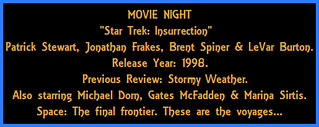
Review #842: Star Trek: Insurrection.
Cast
Patrick Stewart (Captain Jean-Luc Picard), Jonathan Frakes (William Riker), Brent Spiner (Data), LeVar Burton (Geordi La Forge), Michael Dorn (Worf), Gates McFadden (Dr. Beverly Crusher), Marina Sirtis (Deanna Troi), F. Murray Abraham (Ru'afo), Donna Murphy (Anij), Anthony Zerbe (Admiral Dougherty), Gregg Henry (Gallatin), Daniel Hugh Kelly (Sojef), Michael Welch (Artim) Directed by Jonathan Frakes (#840 - Star Trek: First Contact)
Review
Given that I did First Contact on the 50th Anniversary of the original series, I decided to mark the anniversary of the first episode of Star Trek: The Next Generation (September 28, 1987) with the third installment in the Next Generation film series, Insurrection.
After the success (and tone) of First Contact, a decision was made to try and make the next film of the franchise lighter in tone, much like Star Trek IV: The Voyage Home (#492) had been, with its unconventional kind of story (that also had no villain to it). But all that Insurrection proves to be is a middle-of-the-road kind of Star Trek film that doesn't really have much to it. It is tough to say what is the main root of necessarily why it isn't all that enjoyable, because it feels more like splinters of why it manages to bungle itself. Perhaps the big splinter is the plot, with the crew fighting the Federation (read: an Admiral) over the forced migration of immortals (of 600, named the Ba'ku) from the planet (with immortalizing rings) they are on. But really, the dilemma of whether they should be moved or not in order to potentially save millions isn't presented as interestingly as it could have been. Instead of agreeing/disagreeing with the view presented by the movie, one is more likely to not really care about the people affected.
The Ba'ku aren't really presented with much characterization other than "we don't use technology", aside from Murphy, whose scenes with Stewart is fine, but they don't do the movie much in terms of enjoyment. Sure, the deal between the Federation and the Son'a may have been a bit rash (in not asking them, even making a holodeck village in preparation), but I can't imagine this being unsuccessful for millions if it had been presented differently. Had it not been for the climax (and the "twist"), one could full-heartily be for the counterpoint and the people for it and not for the Ba'ku. Abraham (as the villain) is fine, but he only gets interesting around the climax, when he starts trying to destroy everyone, even if he is killed in a mild manner. The effects are fine, but not really anything noteworthy. As weird it may seem, I wish the Ba'ku had some makeup to them, to make them a bit more interesting looking. The Son'a are interesting, with their rubbery look fitting well with their characterization. The main cast is fine, even if they don't really seem to have as much presence with each other compared the other two films with the cast. In a way, it really does feel like a two-parter of the show, just not as good. At 103 minutes, it feels a bit too short, but at least it isn't too much of a slog. Compared to First Contact, it is a disappointment, but it's not like there isn't other things to watch (Like Descent, for example). Some might find the dilemma posed by the movie to more compelling than I did, but for me it just didn't work enough.
Coming soon by the end of the year: An explanation guide for the star ratings on this blog.
Overall, I give it 5 out of 10 stars.

No comments:
Post a Comment